初三英语词组辨析
初三英语词语辨析专题讲解
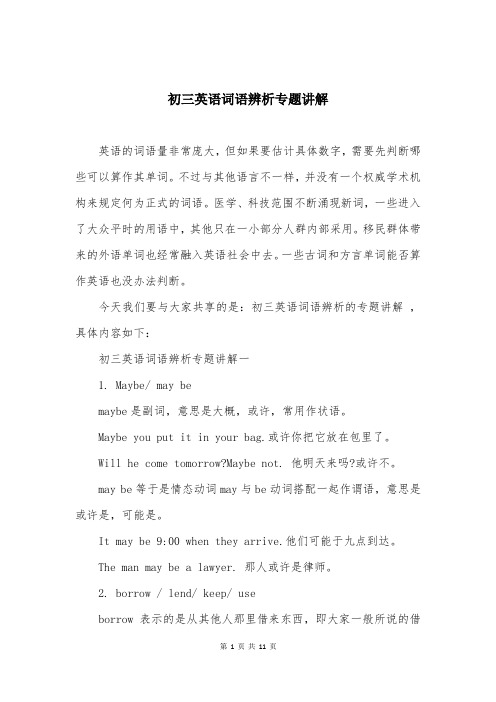
初三英语词语辨析专题讲解英语的词语量非常庞大,但如果要估计具体数字,需要先判断哪些可以算作其单词。
不过与其他语言不一样,并没有一个权威学术机构来规定何为正式的词语。
医学、科技范围不断涌现新词,一些进入了大众平时的用语中,其他只在一小部分人群内部采用。
移民群体带来的外语单词也经常融入英语社会中去。
一些古词和方言单词能否算作英语也没办法判断。
今天我们要与大家共享的是:初三英语词语辨析的专题讲解,具体内容如下:初三英语词语辨析专题讲解一1. Maybe/ may bemaybe是副词,意思是大概,或许,常用作状语。
Maybe you put it in your bag.或许你把它放在包里了。
Will he come tomorrow?Maybe not. 他明天来吗?或许不。
may be等于是情态动词may与be动词搭配一起作谓语,意思是或许是,可能是。
It may be 9:00 when they arrive.他们可能于九点到达。
The man may be a lawyer. 那人或许是律师。
2. borrow / lend/ keep/ useborrow表示的是从其他人那里借来东西,即大家一般所说的借进去。
We often borrow books from our school library.大家经常从学校图书馆借书。
I borrowed this dictionary from my teacher. 我从老师那儿借来了这本字典。
borrow是一个瞬间完成的动作,因此不可以与时间段连用。
You can borrow my recorder for three days.I have borrowed this book for only one week.lend表示的是把自身的东西借给其他人,即大家一般所说的借出去。
Thank you for lending me your bike.谢谢你把自行车借给我。
初中英语常见的30组词汇辨析!
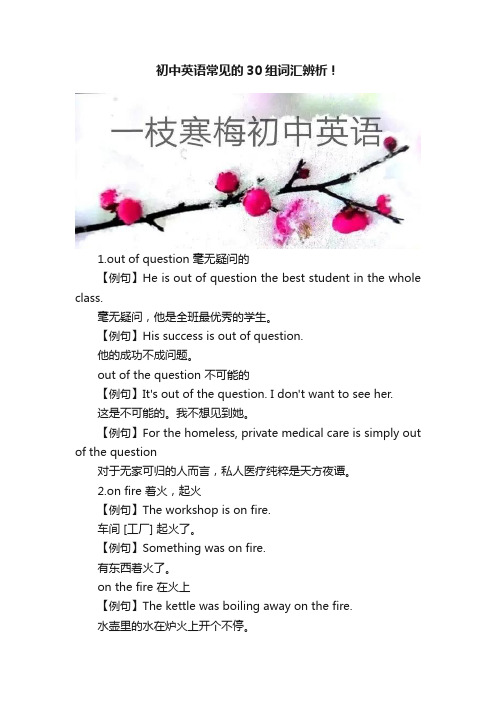
初中英语常见的30组词汇辨析!1.out of question 毫无疑问的【例句】He is out of question the best student in the whole class.毫无疑问,他是全班最优秀的学生。
【例句】His success is out of question.他的成功不成问题。
out of the question 不可能的【例句】It's out of the question. I don't want to see her.这是不可能的。
我不想见到她。
【例句】For the homeless, private medical care is simply out of the question对于无家可归的人而言,私人医疗纯粹是天方夜谭。
2.on fire 着火,起火【例句】The workshop is on fire.车间 [工厂] 起火了。
【例句】Something was on fire.有东西着火了。
on the fire 在火上【例句】The kettle was boiling away on the fire.水壶里的水在炉火上开个不停。
【例句】Put another lump of coal on the fire.往炉火上再加放一块煤。
3.in office 在职的,执政的【例句】He had nothing tangible to show off three years in office.他为官三年,无实绩可言。
【例句】Which political party is in office in your country ?贵国是哪一个政党执政?in the office 在办公室里【例句】He was wanted in the office.有人在办公室找他。
【例句】Would you introduce me to others in the office?你能把我介绍给办公室的其他人吗?4.the doctor and teacher 指一个人,既是医生又是老师。
中考英语高频词汇词组语法,重难点语法辨析
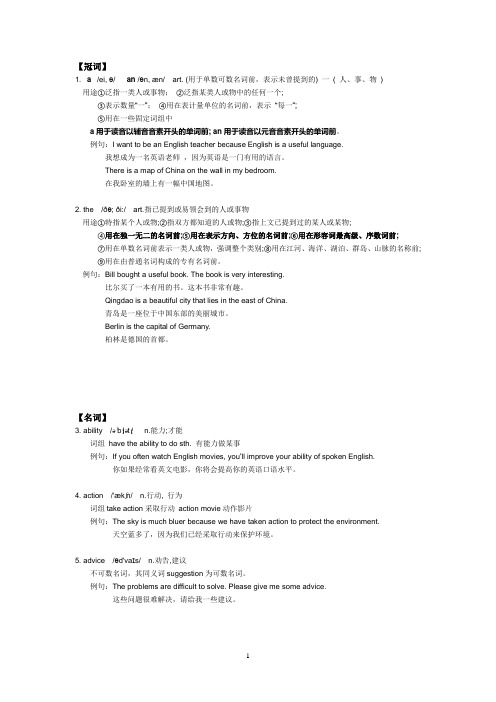
【冠词】1. a /ei, ə/ an /ən, æn/art. (用于单数可数名词前,表示未曾提到的) 一( 人、事、物)用途①泛指一类人或事物;②泛指某类人或物中的任何一个;③表示数量“一”;④用在表计量单位的名词前,表示“每一”;⑤用在一些固定词组中a用于读音以辅音音素开头的单词前; an用于读音以元音音素开头的单词前。
例句:I want to be an English teacher because English is a useful language.我想成为一名英语老师,因为英语是一门有用的语言。
There is a map of China on the wall in my bedroom.在我卧室的墙上有一幅中国地图。
2. the /ðə; ði:/ art.指已提到或易领会到的人或事物用途①特指某个人或物;②指双方都知道的人或物;③指上文已提到过的某人或某物;④用在独一无二的名词前;⑤用在表示方向、方位的名词前;⑥用在形容词最高级、序数词前;⑦用在单数名词前表示一类人或物,强调整个类别;⑧用在江河、海洋、湖泊、群岛、山脉的名称前;⑨用在由普通名词构成的专有名词前。
例句:Bill bought a useful book. The book is very interesting.比尔买了一本有用的书。
这本书非常有趣。
Qingdao is a beautiful city that lies in the east of China.青岛是一座位于中国东部的美丽城市。
Berlin is the capital of Germany.柏林是德国的首都。
【名词】3. ability /əˈbɪlətɪ/ n.能力;才能词组have the ability to do sth. 有能力做某事例句:If you often watch English movies, you’ll improve your ability of spoken English.你如果经常看英文电影,你将会提高你的英语口语水平。
中考英语近义词汇及词组辨析

中考英语近义词汇及词组辨析中考英语考试中,近义词汇及词组的辨析是一个很重要的考点。
同学们在备考过程中应该特别注意掌握这些词汇及词组的区别和用法。
本文将为大家介绍一些常见的近义词汇及词组,帮助同学们更好地应对中考英语。
一、accurate与correctaccurate和correct都表示“准确的”。
它们的区别在于:accurate强调准确度的高,而correct则更多地强调符合规范、正确的。
例如:1. The scientist made accurate measurements. (科学家做出了准确的测量。
)2. Please correct your mistakes in the essay. (请在作文中纠正你的错误。
)二、advice与adviseadvice是名词,意为“建议”或“忠告”,而advise是动词,意为“建议”或“提供意见”。
例如:1. Can you give me some advice on how to learn English? (你能给我一些建议如何学习英语吗?)2. I advise you not to be late for the meeting. (我建议你们不要迟到会议。
)三、borrow与lendborrow和lend都与“借”的概念有关,但使用上有所不同。
borrow表示“借入”,lend表示“借出”。
例如:1. Can I borrow your pen? (我能借用你的钢笔吗?)2. Could you lend me some money? (你能借给我一些钱吗?)四、famous与popularfamous和popular都表示“著名的”,但有所不同。
famous更多地指代某个人或事物在广泛的范围内被人所熟知,而popular则更多地指代某个人或事物在大众之间受欢迎。
例如:1. Mozart is a famous composer. (莫扎特是一个著名的作曲家。
中考重点常见词汇和短语的辨析
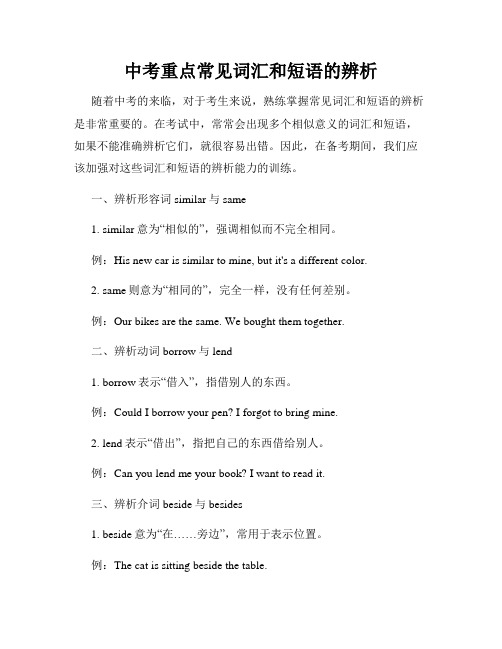
中考重点常见词汇和短语的辨析随着中考的来临,对于考生来说,熟练掌握常见词汇和短语的辨析是非常重要的。
在考试中,常常会出现多个相似意义的词汇和短语,如果不能准确辨析它们,就很容易出错。
因此,在备考期间,我们应该加强对这些词汇和短语的辨析能力的训练。
一、辨析形容词similar与same1. similar意为“相似的”,强调相似而不完全相同。
例:His new car is similar to mine, but it's a different color.2. same则意为“相同的”,完全一样,没有任何差别。
例:Our bikes are the same. We bought them together.二、辨析动词borrow与lend1. borrow表示“借入”,指借别人的东西。
例:Could I borrow your pen? I forgot to bring mine.2. lend表示“借出”,指把自己的东西借给别人。
例:Can you lend me your book? I want to read it.三、辨析介词beside与besides1. beside意为“在……旁边”,常用于表示位置。
例:The cat is sitting beside the table.2. besides意为“除了……之外”,常用于表示除了某事物或某人之外还有其他的事物或人。
例:Besides apples, we also have oranges.四、辨析动词learn与teach1. learn表示“学习”,指通过努力和训练获取新的知识或技能。
例:I learn English every day.2. teach表示“教”,指教授知识或技能给他人。
例:She teaches us math every Monday.五、辨析连词unless与if1. unless意为“除非”,相当于if not。
初中英语词语辨析精华版
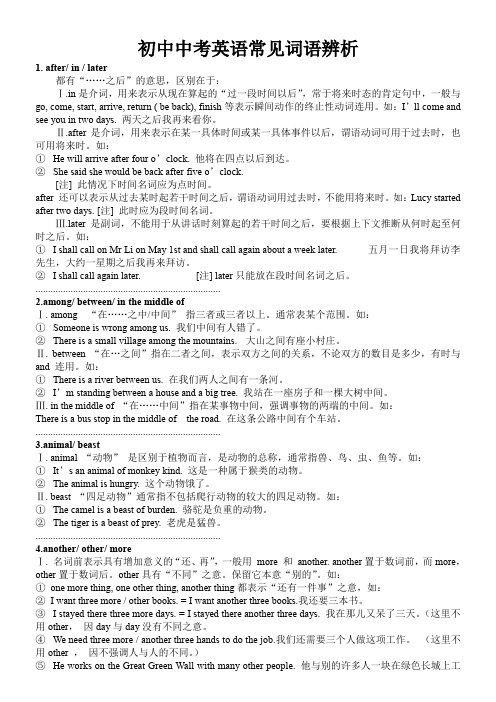
初中中考英语常见词语辨析1. after/ in / later都有“……之后”的意思,区别在于:Ⅰ.in是介词,用来表示从现在算起的“过一段时间以后”,常于将来时态的肯定句中,一般与go, come, start, arrive, return ( be back), finish等表示瞬间动作的终止性动词连用。
如:I’ll come and see you in two days. 两天之后我再来看你。
Ⅱ.after是介词,用来表示在某一具体时间或某一具体事件以后,谓语动词可用于过去时,也可用将来时。
如:①He will arrive after four o’clock. 他将在四点以后到达。
②She said she would be back after five o’clock.[注] 此情况下时间名词应为点时间。
after 还可以表示从过去某时起若干时间之后,谓语动词用过去时,不能用将来时。
如:Lucy started after two days. [注] 此时应为段时间名词。
Ⅲ.later是副词,不能用于从讲话时刻算起的若干时间之后,要根据上下文推断从何时起至何时之后。
如:①I shall call on Mr Li on May 1st and shall call again about a week later. 五月一日我将拜访李先生,大约一星期之后我再来拜访。
②I shall call again later. [注] later只能放在段时间名词之后。
..........................................................................2.among/ between/ in the middle ofⅠ. among “在……之中/中间”指三者或三者以上。
通常表某个范围。
如:①Someone is wrong among us. 我们中间有人错了。
(完整)初中英语词汇辨析
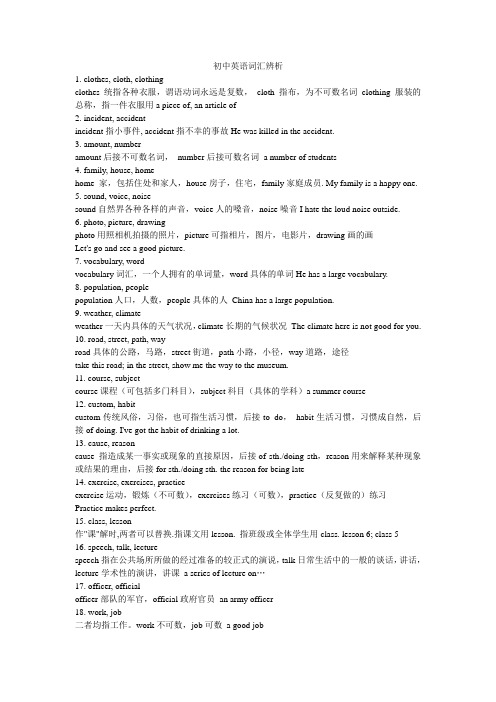
初中英语词汇辨析1. clothes, cloth, clothingclothes统指各种衣服,谓语动词永远是复数,cloth指布,为不可数名词clothing 服装的总称,指一件衣服用a piece of, an article of2. incident, accidentincident指小事件, accident指不幸的事故He was killed in the accident.3. amount, numberamount后接不可数名词,number后接可数名词a number of students4. family, house, homehome 家,包括住处和家人,house房子,住宅,family家庭成员. My family is a happy one.5. sound, voice, noisesound自然界各种各样的声音,voice人的嗓音,noise噪音I hate the loud noise outside.6. photo, picture, drawingphoto用照相机拍摄的照片,picture可指相片,图片,电影片,drawing画的画Let's go and see a good picture.7. vocabulary, wordvocabulary词汇,一个人拥有的单词量,word具体的单词He has a large vocabulary.8. population, peoplepopulation人口,人数,people具体的人China has a large population.9. weather, climateweather一天内具体的天气状况,climate长期的气候状况The climate here is not good for you.10. road, street, path, wayroad具体的公路,马路,street街道,path小路,小径,way道路,途径take this road; in the street, show me the way to the museum.11. course, subjectcourse课程(可包括多门科目),subject科目(具体的学科)a summer course12. custom, habitcustom传统风俗,习俗,也可指生活习惯,后接to do,habit生活习惯,习惯成自然,后接of doing. I've got the habit of drinking a lot.13. cause, reasoncause 指造成某一事实或现象的直接原因,后接of sth./doing sth,reason用来解释某种现象或结果的理由,后接for sth./doing sth. the reason for being late14. exercise, exercises, practiceexercise运动,锻炼(不可数),exercises练习(可数),practice(反复做的)练习Practice makes perfect.15. class, lesson作"课"解时,两者可以替换.指课文用lesson. 指班级或全体学生用class. lesson 6; class 516. speech, talk, lecturespeech指在公共场所所做的经过准备的较正式的演说,talk日常生活中的一般的谈话,讲话,lecture学术性的演讲,讲课a series of lecture on…17. officer, officialofficer部队的军官,official政府官员an army officer18. work, job二者均指工作。
九年级英语重点词汇短语词义辨析
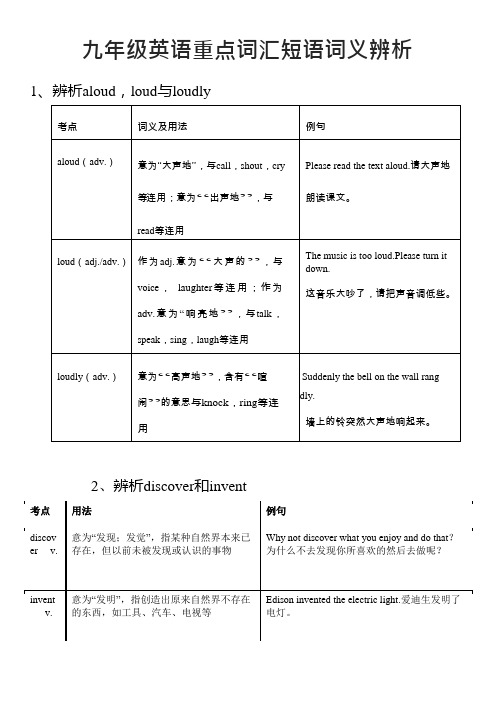
dress
既可表示动作也可表示状态,其后常跟人作宾语
Annie is dressing her sister.安妮在给她妹妹穿衣服。
6、辨析die,dead,dying与death
考点
用法
例句
die
v.死,死亡,指因为生病、年老、负伤等原因而死,是非延续性动词,不能同表示一段时间的状语连用
九年级英语重点词汇短语词义辨析
1、辨析aloud,loud与loudly
考点
词义及用法
例句
aloud(adv.)
意为‘‘大声地’’,与call,shout,cry等连用;意为“出声地”,与read等连用
Please read the text aloud.请大声地朗读课文。
loud(adj./adv.)
He died two years ago.他是两年前去世的。
dead
adj.死的,无生命的,表示状态,可以与表示一段时间的状语连用。如果表达“死了多长时间”,用“have/has been dead for+时间段”或“died+时间段+ago”表示
His grandfather has been dead for ten years.=His grandfather died ten years ago.他的祖父已经去世十年了。
He put on his hat and went out.他戴上帽子出门了。
wear
意为“穿着;戴着”。强调穿/戴的状态
The lady was wearing a dress and sunglasses.那个女士穿着礼服戴着太阳眼镜。
中考英语常用词语辨析.docx
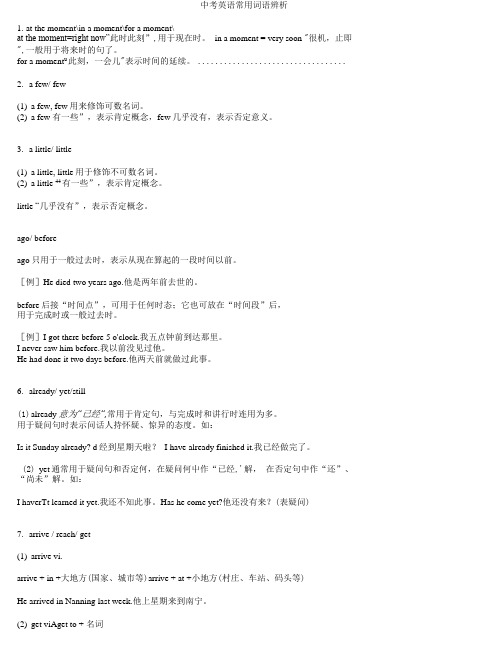
中考英语常用词语辨析1.at the moment\in a moment\for a moment\at the moment=right now”此时此刻”,用于现在时。
in a moment = very soon "很机,止即",一般用于将来时的句了。
for a moment u此刻,一会儿"表示时间的延续。
..................................2. a few/ few(1)a few, few用来修饰可数名词。
(2)a few 有一些”,表示肯定概念,few几乎没有,表示否定意义。
3. a little/ little(1)a little, little用于修饰不可数名词。
(2)a little 44有一些”,表示肯定概念。
little “几乎没有”,表示否定概念。
ago/ beforeago只用于一般过去时,表示从现在算起的一段时间以前。
[例]He died two years ago.他是两年前去世的。
before后接“时间点”,可用于任何时态;它也可放在“时间段”后,用于完成时或一般过去时。
[例]I got there before 5 o'clock.我五点钟前到达那里。
I never saw him before.我以前没见过他。
He had done it two days before.他两天前就做过此事。
6.already/ yet/still(1)a lready意为“已经”,常用于肯定句,与完成时和讲行时连用为多。
用于疑问句时表示问话人持怀疑、惊异的态度。
如:Is it Sunday already? d经到星期天啦?I have already finished it.我已经做完了。
(2)yet通常用于疑问句和否定何,在疑问何屮作“已经,'解,在否定句中作“还”、“尚未”解。
如:I haverTt learned it yet.我还不知此事。
【中考复习】中考英语必背20组词语辨析

【中考复习】中考英语必背20组词语辨析初中阶段大致有150组词语辨析,近几年中考英语常考的有20组左右?中考试题考查词语辨析主要就是每组词或短语之间的细小差别,就是为了检测同学们分辨词形和运用词汇的能力?词语辨析集中在对实词,即对名词?动词?形容词?副词等的考查?主要考查同义?近义?形近词汇的辨析以及词组与习惯用法的辨析?1.after,in这两个介词都可以表示“……(时间)以后”的意思?after以过去为起点,则表示过去一段时间之后,常用于过去时态的句子中?如shewentafterthreedays.她就是三天以后跑的?in以现在为起点,表将来一段时间以后,常用于将来时态的句子中?如shewillgointhreedays.她三天以后要走?2.howlong,howoften,howsoonhowlong指多长时间,主要用来对一段时间(如threedays,fourweeks等)提问?如howlongagowasit?这是多久前的事了?3.few,afew,little,alittle,several,somefew和little的意思是否定的,表示“很少”或“几乎没有”;而afew和alittle的意思是肯定的,表示“有一些,有一点儿”?few和afew润色可数名词;little和alittle润色不可数名词?several用于修饰可数名词,语意比afew和some更肯定,含有“好几个”的意思?some可以润色可数名词,也可以润色不可数名词,从数量上说道,它有时相等于afew或alittle,有时所指更多一些的数量?4.theother,anothertheother指两个人或事物中的“另一个”,则表示特指?如westoodononesideoftheroadandtheystoodontheother.我们东站在街这边,他们东站在那边?another着重于不定数目中的“另外一个”,表示泛指,所以常用来指至少三个中的一个?如shehastakenanotherofmybooks.她已经拿了我的另外一本书?。
初中英语中考词汇辨析(共14组)
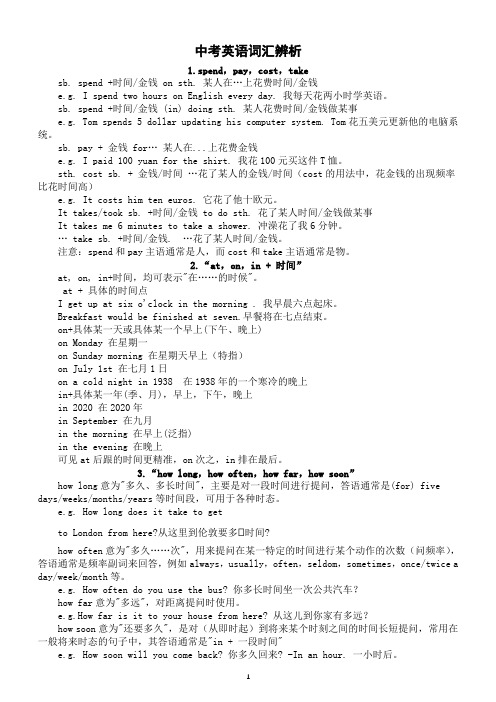
中考英语词汇辨析1.spend,pay,cost,takesb. spend +时间/金钱 on sth. 某人在…上花费时间/金钱e.g. I spend two hours on English every day. 我每天花两小时学英语。
sb. spend +时间/金钱 (in) doing sth. 某人花费时间/金钱做某事e.g. Tom spends 5 dollar updating his computer system. Tom花五美元更新他的电脑系统。
sb. pay + 金钱 for…某人在...上花费金钱e.g. I paid 100 yuan for the shirt. 我花100元买这件T恤。
sth. cost sb. + 金钱/时间…花了某人的金钱/时间(cost的用法中,花金钱的出现频率比花时间高)e.g. It costs him ten euros. 它花了他十欧元。
It takes/took sb. +时间/金钱 to do sth. 花了某人时间/金钱做某事It takes me 6 minutes to take a shower. 冲澡花了我6分钟。
… take sb. +时间/金钱. …花了某人时间/金钱。
注意:spend和pay主语通常是人,而cost和take主语通常是物。
2.“at,on,in + 时间”at, on, in+时间,均可表示"在……的时候"。
at + 具体的时间点I get up at six o'clock in the morning . 我早晨六点起床。
Breakfast would be finished at seven.早餐将在七点结束。
on+具体某一天或具体某一个早上(下午、晚上)on Monday 在星期一on Sunday morning 在星期天早上(特指)on July 1st 在七月1日on a cold night in 1938 在1938年的一个寒冷的晚上in+具体某一年(季、月),早上,下午,晚上in 2020 在2020年in September 在九月in the morning 在早上(泛指)in the evening 在晚上可见at后跟的时间更精准,on次之,in排在最后。
中考20组必考英语易混词辨析

初中必考20组必考英语易混词辨析——易混词辨析——1、accomplish vs. achieveaccomplish (v.): 完成某项任务。
例子: She accomplished her homework. (她完成了作业。
)achieve (v.): 实现目标。
例子: He achieved his goal. (他实现了他的目标。
)2、advice vs. adviseadvice (n.): 建议。
例子: I need your advice. (我需要你的建议。
)advise (v.): 提供建议。
例子: I advise you to study. (我建议你学习。
)3、allow vs. permitallow (v.): 允许,通常口语化。
例子: My parents allow me to go out. (我的父母允许我出去。
)permit (v.): 允许,通常正式。
例子: The school permits it. (学校允许这样做。
)4、bored vs. boringbored (adj.): 感到无聊的。
例子: I feel bored in class. (我在课堂上感到无聊。
)boring (adj.): 令人无聊的。
例子: The movie was boring. (这部电影很无聊。
)5、careful vs. cautiouscareful (adj.): 小心的。
例子: Be careful with that glass. (小心那只玻璃杯。
)cautious(adj.): 小心翼翼的,避免风险。
例子: He is cautious with money. (他在处理钱时很小心。
)6、common vs. ordinarycommon (adj.): 普遍的。
例子: It is common to use phones. (使用手机是很常见的。
中考常考易错词组辨析
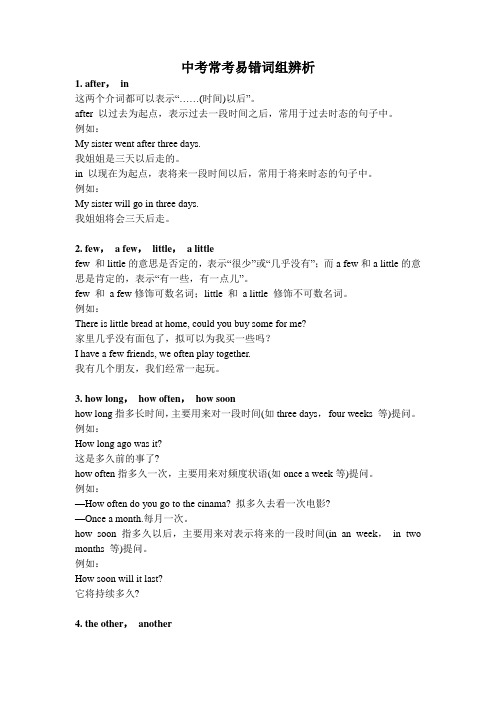
中考常考易错词组辨析1. after,in这两个介词都可以表示“……(时间)以后”。
after 以过去为起点,表示过去一段时间之后,常用于过去时态的句子中。
例如:My sister went after three days.我姐姐是三天以后走的。
in 以现在为起点,表将来一段时间以后,常用于将来时态的句子中。
例如:My sister will go in three days.我姐姐将会三天后走。
2. few,a few,little,a littlefew 和little的意思是否定的,表示“很少”或“几乎没有”;而a few和a little的意思是肯定的,表示“有一些,有一点儿”。
few 和a few修饰可数名词;little 和a little 修饰不可数名词。
例如:There is little bread at home, could you buy some for me?家里几乎没有面包了,拟可以为我买一些吗?I have a few friends, we often play together.我有几个朋友,我们经常一起玩。
3. how long,how often,how soonhow long指多长时间,主要用来对一段时间(如three days,four weeks 等)提问。
例如:How long ago was it?这是多久前的事了?how often指多久一次,主要用来对频度状语(如once a week等)提问。
例如:—How often do you go to the cinama? 拟多久去看一次电影?—Once a month.每月一次。
how soon指多久以后,主要用来对表示将来的一段时间(in an week,in two months 等)提问。
例如:How soon will it last?它将持续多久?4. the other,anotherthe other 指两者中的“另一个”,表示特指,可接单数名词,也可单独使用。
初三英语的词汇辨析

初三英语的词汇辨析初三英语的词汇辨析1. think/ think/about/ think of(1) think 单独使用时表示思考,接that 宾语从句时意为认为,觉得。
I am thinking how to work out the problem.I think she is a good student.当宾语从句含有否定概念时,通常形式上否定think ,但意义上却是否定宾语从句。
I dont think he can come.I dont think it will be windy.(2)think about 可接一个名词,动词-ing 形式或由疑问词引导的.不定式或宾语从句,意思是考虑。
I have thought about it for a long time.Please think about how to tell her the bad news.(3)think of 表示认为,一般用于疑问句中,与what 连用。
What do you think of the TV play? = How do you like the TV play?2. big/ large/ great上述形容词都表示大,但侧重点及程度不同。
(1) big指具体事物的大小,强调比正常形体的标准大,既可用在普通场合,也可用在正式场合。
它可用来指人的身材高大或长大了,还可表示伟大,重要之意。
如:Can you lift up this big stone?On the last day I made a big decision.(2) large特别强调远远超过标准的大,指体积、面积、容积、数量之大。
中考英语必背词语辨析20组

中考英语必背词语辨析20组中考英语必背词语辨析20组词语辨析集中在对实词,即对名词动词、形容词、副词等的考查,主要考查同义、近义、形近词汇的辨析以及词组与习惯用法的辨析。
1. after, in这两个介词都可以表示“(时间)以后”的意思?after 以过去为起点,表示过去一段时间之后,常用于过去时态的句子中?如:She went after three days. 她是三天以后走的?in 以现在为起点,表将来一段时间以后,常用于将来时态的句子中?如:She will go in three days. 她三天以后要走?2. how long, how often, how soonhow long指多长时间,主要用来对一段时间(如three days, four weeks 等)提问?如:How long ago was it? 这是多久前的事了?how often指每隔多久,主要用来对频率副词或状语(如once a week等)提问?如:—How often does he come here? —Once a month. 他(每隔)多久来一次?每月一次?how soon指再过多久,主要用来对表示将来的一段时间(in an hour, in two weeks 等)提问?如:How soon can you come? 你多快能赶来?3. few, a few, little, a little, several, somefew 和little的意思是否定的,表示“很少”或“几乎没有”;而a few和a little的意思是肯定的,表示“有一些,有一点儿”?few 和 a few修饰可数名词;little 和 a little 修饰不可数名词?several用于修饰可数名词,语意比a few和some更肯定,含有“好几个”的意思?some可修饰可数名词,也可修饰不可数名词,从数量上说,它有时相当于a few 或 a little,有时指更多一些的数量?4. the other, anotherthe other 指两个人或事物中的“另一个”,表示特指?如:Westood on one side of the road and they stood on the other. 我们站在街这边,他们站在那边?another着重于不定数目中的“另外一个”,表示泛指,所以常用来指至少三个中的一个?如:She has taken another of my books. 她已经拿了我的另外一本书?5. spend, take, cost, payspend的宾语通常是时间?金钱?在主动语态中,句子的主语必须是人,而且后面不能用动词不定式做它的宾语?如:She spent the whole evening in reading. 她把整个晚上用来读书?take常常用来指“花费”时间,句子的主语通常是表示事物的词语?如:How long will this job take you?你做这项工作要花多长时间?cost 指花费时间?金钱或力气等,只能用表示事物的词做主语,并且不能用于被动语态?如:How much does the jacket cost?这件夹克多少钱?pay 主要指主语(某人)买某物(或为某事)付多少钱(给某人)?如:I pay for my rooms by month. 我按月支付租金?6. speak, say, talk, tell这四个动词都有“说”的意思?speak的意思是“讲话;演讲”,着重指说话的动作,指开口说或连续不断地说,多用作不及物动词;用作及物动词时,其宾语是语言名称?如:He can speak Japanese. 他会说日语?只能接“提议,计划,方案”等词句?如:I agree to the terms proposed. 我同意拟议的条件?7. among, betweenbetween 的意思是“在中间,在之间”,一般指在两者之间?如:There is a table between two windows. 在两扇窗户之间有一张桌子?between 有时也表示在多于两个以上的事物之间,但那是指在每二者之间?如:the relationship between different provinces and municiplities 省市和省市之间的关系(这里是指每两个省市之间的相互关系?)among 的意思是“在中间?在之中”,一般指在三个或三个以上的同类事物之中?如:The teacher distributed them among the students. 老师把这些东西分给了学生?8. beat, win这两个词都有“获胜,打败”的意思,但其后宾语不同?beat是“打败,优于”的意思,后面接人或队?如:We beat them. 我们打败了他们?win指“赢,获胜”,后面接比赛?名次?如:We won the match/game/race/the first place. 我们赢了这场比赛(获得了第一名)?9. agree with, agree on, agree toagree on表示“就取得一致意见”?如:We all agree on (making) an early start. 我们一致同意及早出发?agree with表示“与意见一致”,后面既可以跟表示人的名词或人称代词,也可以跟表示意见?看法的名词或what引导的从句?如:I agree with you without reservation。
初三英语词组辨析汇总
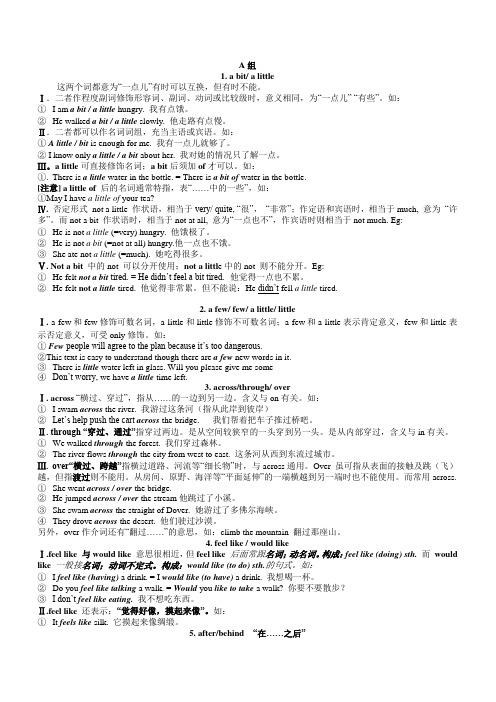
A组1. a bit/ a little这两个词都意为―一点儿‖有时可以互换,但有时不能。
Ⅰ.二者作程度副词修饰形容词、副词、动词或比较级时,意义相同,为―一点儿‖ ―有些‖。
如:①I am a bit / a little hungry. 我有点饿。
②He walked a bit / a little slowly. 他走路有点慢。
Ⅱ.二者都可以作名词词组,充当主语或宾语。
如:①A little / bit is enough for me. 我有一点儿就够了。
② I know only a little / a bit about her. 我对她的情况只了解一点。
Ⅲ。
a little可直接修饰名词;a bit后须加of才可以。
如:①.There is a little water in the bottle. = There is a bit of water in the bottle.[注意]a little of后的名词通常特指,表―……中的一些‖,如:①May I have a little of your tea?Ⅳ. 否定形式not a little 作状语,相当于very/ quite, ―很‖,―非常‖;作定语和宾语时,相当于much, 意为―许多‖。
而not a bit 作状语时,相当于not at all, 意为―一点也不‖,作宾语时则相当于not much. Eg:①He is not a little (=very) hungry. 他饿极了。
②He is not a bit (=not at all) hungry.他一点也不饿。
③She ate not a little (=much). 她吃得很多。
Ⅴ. Not a bit中的not 可以分开使用;not a littl e中的not 则不能分开。
Eg:①He felt not a bit tired. = He didn‘t feel a bit tired. 他觉得一点也不累。
初三英语词组辨析

A组1. a bit/ a little这两个词都意为―一点儿‖有时可以互换,但有时不能。
Ⅰ.二者作程度副词修饰形容词、副词、动词或比较级时,意义相同,为―一点儿‖ ―有些‖。
如:①I am a bit / a little hungry. 我有点饿。
②He walked a bit / a little slowly. 他走路有点慢。
Ⅱ.二者都可以作名词词组,充当主语或宾语。
如:①A little / bit is enough for me. 我有一点儿就够了。
② I know only a little / a bit about her. 我对她的情况只了解一点。
Ⅲ。
a little可直接修饰名词;a bit后须加of才可以。
如:①.There is a little water in the bottle. = There is a bit of water in the bottle.[注意]a little of后的名词通常特指,表―……中的一些‖,如:①May I have a little of your tea?Ⅳ. 否定形式not a little 作状语,相当于very/ quite, ―很‖,―非常‖;作定语和宾语时,相当于much, 意为―许多‖。
而not a bit 作状语时,相当于not at all, 意为―一点也不‖,作宾语时则相当于not much. Eg:①He is not a little (=very) hungry. 他饿极了。
②He is not a bit (=not at all) hungry.他一点也不饿。
③She ate not a little (=much). 她吃得很多。
Ⅴ. Not a bit中的not 可以分开使用;not a littl e中的not 则不能分开。
Eg:①He felt not a bit tired. = He didn‘t feel a bit tired. 他觉得一点也不累。
九年级英语词汇辨析专题讲解
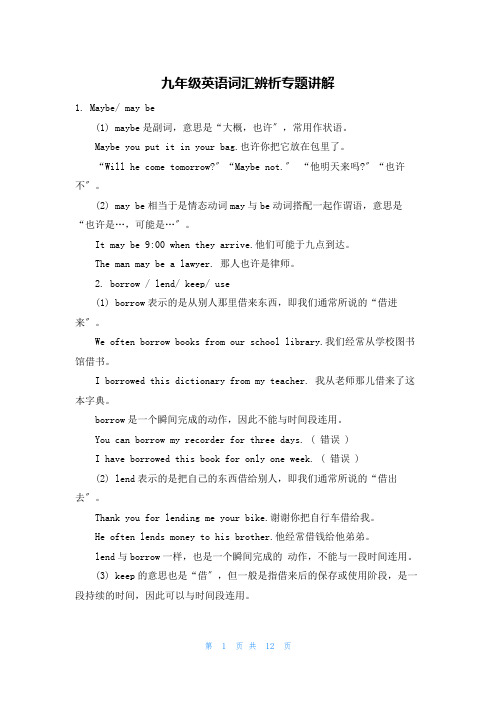
九年级英语词汇辨析专题讲解1. Maybe/ may be(1) maybe是副词,意思是“大概,也许〞,常用作状语。
Maybe you put it in your bag.也许你把它放在包里了。
“Will he come tomorrow?〞“Maybe not.〞“他明天来吗?〞“也许不〞。
(2) may be相当于是情态动词may与be动词搭配一起作谓语,意思是“也许是…,可能是…〞。
It may be 9:00 when they arrive.他们可能于九点到达。
The man may be a lawyer. 那人也许是律师。
2. borrow / lend/ keep/ use(1) borrow表示的是从别人那里借来东西,即我们通常所说的“借进来〞。
We often borrow books from our school library.我们经常从学校图书馆借书。
I borrowed this dictionary from my teacher. 我从老师那儿借来了这本字典。
borrow是一个瞬间完成的动作,因此不能与时间段连用。
You can borrow my recorder for three days. ( 错误 )I have borrowed this book for only one week. ( 错误 )(2) lend表示的是把自己的东西借给别人,即我们通常所说的“借出去〞。
Thank you for lending me your bike.谢谢你把自行车借给我。
He often lends money to his brother.他经常借钱给他弟弟。
lend与borrow一样,也是一个瞬间完成的动作,不能与一段时间连用。
(3) keep的意思也是“借〞,但一般是指借来后的保存或使用阶段,是一段持续的时间,因此可以与时间段连用。
You can keep my recorder for three days.我的录音机你可以借用三天。
中考英语常见词语词组辨析

中考英语常见词语词组辨析1.after, in两个皆为介词,表示“......(时间)以后”。
after以过去为起点,表示过去一段时间之后,常用于过去时态的句子中。
例如:She went after three days.(她是三天以后走的。
)in以现在为起点,表示将来一段时间以后,常用于将来时态的句子。
例如:She will go in three days. (她三天后就要走了。
)2.how long, how often, how soonhow long指多长时间,主要用来对一段时间(如three days, four weeks等)的提问。
例如:--How long have you been like these?(你这样多久了?)--Four two days.(两天。
)how often指每隔多久,主要用来对表示将来的一段时间(in an hour, in two weeks 等)的提问。
例如:--How often does he come here?(他多久来一次?)--Once a month.(每月一次。
)how soon指再过多久,主要用来对表示将来的一段时间(in an hour, in two weeks 等)的提问。
例如:--How soon can you come?(你多快能赶来?)--In two days. (两天后。
)3. few, a few, little, a littlefew和little的意思是否定的,表示“很少”或“几乎没有”;而a few和a little的意思是肯定的,表示“有一些;有一点儿”。
few和a few修饰可数名词;little和a little修饰不可数名词。
I'm a little hungry because I drank little milk and ate few cakes for breakfast. Now I want to eat a few vegetables.我有点儿饿,因为我早餐几乎没喝牛奶,没吃蛋糕。
- 1、下载文档前请自行甄别文档内容的完整性,平台不提供额外的编辑、内容补充、找答案等附加服务。
- 2、"仅部分预览"的文档,不可在线预览部分如存在完整性等问题,可反馈申请退款(可完整预览的文档不适用该条件!)。
- 3、如文档侵犯您的权益,请联系客服反馈,我们会尽快为您处理(人工客服工作时间:9:00-18:30)。
A组1. a bit/ a little这两个词都意为“一点儿”有时可以互换,但有时不能。
Ⅰ.二者作程度副词修饰形容词、副词、动词或比较级时,意义相同,为“一点儿” “有些”。
如:①I am a bit / a little hungry. 我有点饿。
②He walked a bit / a little slowly. 他走路有点慢。
Ⅱ.二者都可以作名词词组,充当主语或宾语。
如:①A little / bit is enough for me. 我有一点儿就够了。
② I know only a little / a bit about her. 我对她的情况只了解一点。
Ⅲ。
a little可直接修饰名词;a bit后须加of才可以。
如:①.There is a little water in the bottle. = There is a bit of water in the bottle.[注意]a little of后的名词通常特指,表“……中的一些”,如:①May I have a little of your tea?Ⅳ. 否定形式not a little 作状语,相当于very/ quite, “很”,“非常”;作定语和宾语时,相当于much, 意为“许多”。
而not a bit 作状语时,相当于not at all, 意为“一点也不”,作宾语时则相当于not much. Eg:①He is not a little (=very) hungry. 他饿极了。
②He is not a bit (=not at all) hungry.他一点也不饿。
③She ate not a little (=much). 她吃得很多。
Ⅴ. Not a bit中的not 可以分开使用;not a littl e中的not 则不能分开。
Eg:①He felt not a bit tired. = He didn’t feel a bit tired. 他觉得一点也不累。
②He felt not a little tired. 他觉得非常累。
但不能说:He didn’t fell a little tired.2. a few/ few/ a little/ littleⅠ. a few和few修饰可数名词,a little和little修饰不可数名词;a few和a little表示肯定意义,few和little表示否定意义,可受only修饰。
如:①Few people will agree to the plan because it’s too dangerous.②This text is easy to understand though there are a few new words in it.③There is little water left in glass. Will you please give me some④Don’t worry, we have a little time left.3. across/through/ overⅠ. across “横过、穿过”,指从……的一边到另一边。
含义与on有关。
如:①I swam across the river. 我游过这条河(指从此岸到彼岸)②Let’s help push the cart across the bridge. 我们帮着把车子推过桥吧。
Ⅱ. through “穿过、通过”指穿过两边。
是从空间较狭窄的一头穿到另一头。
是从内部穿过,含义与in有关。
①We walked through the forest. 我们穿过森林。
②The river flows through the city from west to east. 这条河从西到东流过城市。
Ⅲ. over“横过、跨越”指横过道路、河流等“细长物”时,与across通用。
Over 虽可指从表面的接触及跳(飞)越,但指渡过则不能用。
从房间、原野、海洋等“平面延伸”的一端横越到另一端时也不能使用。
而常用across.①She went across / over the bridge.②He jumped across / over the stream他跳过了小溪。
③She swam across the straight of Dover. 她游过了多佛尔海峡。
④They drove across the desert. 他们驶过沙漠。
另外,over作介词还有“翻过……”的意思,如:climb the mountain 翻过那座山。
4. feel like / would likeⅠ.feel like 与would like 意思很相近,但feel like 后面常跟名词;动名词。
构成:feel like (doing) sth. 而would like 一般接名词;动词不定式。
构成:would like (to do) sth.的句式。
如:①I feel like (having) a drink. = I would like (to have) a drink. 我想喝一杯。
②Do you feel like talking a walk. = Would you like to take a walk? 你要不要散步?③I don’t feel like eating.我不想吃东西。
Ⅱ.feel like 还表示:“觉得好像,摸起来像”。
如:①It feels like silk. 它摸起来像绸缎。
5. after/behind“在……之后”Ⅰ. after “在……(时间)之后”;“在……(地点)之后”,指次序。
如:①He came after ten o’clock. 他十点以后来的。
②Two days afte r his arrival, I called on him. 在他到达两天以后,我拜访了他。
③‘Against’ comes after‘again’ in this cictionary.在这本字典中‘against’ 排在‘again’ 之后。
Ⅱ. behind 表地点时意为:在……后面、着重指位置的前后。
偶尔也指时间,表按照一定的时刻而迟了的意思。
①The garden is behind the house.②He stood behind me.③The train was behind time. 火车误点了。
④You are two hours behind. 你迟了两个小时。
6. ago/beforeⅠ. ago adv.“……以前”指从此刻起,若干时间以前,通常与过去连用。
如:①It happened two days ago.这件事发生在两天以前。
②I met him a few minutes ago.我在几分钟以前碰到他。
Ⅱ. before adv, prep & conj “……以前”指从那时起若干时间以前。
通常与完成时、过去时等连用。
还可用作前置词或连接词表时间,而ago 则不能这样用。
①He said that he had seen her two days before.他说他两天前见到过她。
(表从她说话那时起两天前)②I had been fine the day before.(那天)前一天的天气很好。
③I’ve seen that film before.④I never met him before.7. agree to/ agree with/ agree on(up on)Ⅰ. agree to “同意、应允”通常用于同意某件事情(我们可以同意我们自己有不同看法而并不赞同的事情)。
①Do you agree to this plan?②He agreed to my proposal.他同意了我的提议。
③I agreed to his terms. 我同意了他的条件。
Ⅱ. agree with “同意、赞同”常常表示同某人意见一致,也可表赞同某件事情。
还有“(气候、食物等)适合”之意。
如:①I quite agree with you.我很同意你。
②Do you agree with me ?③I agree with all you say.我同意你所说的。
④His words do not agree with his actions.他言行不一致。
⑤Too much meat doesn’t agree with her. 吃太多肉对她身体不合适。
[注]:agree with 不能用于被动语态。
Ⅲ. agree on /upon “对……取得一致意见”指两方或多方就某个问题取得了一致的意见或达成了某种协议。
如:①After discussion the two sides agreed on a cease-fire. 经过讨论,双方就停火问题达成了协议。
②They all agree on the plan.他们对这个计划意见一致。
[注]:此句型可转换成agree in doing sth.如:① All of them agreed on / upon it. = All of them agreed in doing it. 他们对做这个问题达成了共识。
8. at times / at all times / all the timeⅠ. at times “不时;偶尔”如:①The tide is , at times, very high. 潮水有时涨得高。
②I make mistakes at times when I speak English. 我说英语偶尔会出错。
Ⅱ. a t all times.“随时;任何时候;总是”如:He has a cool head at all times.他随时都有清醒的头脑。
Ⅲ. all the time “一直;始终”其中time用单数形式。
如:The baby cries all the time.那婴儿一直哭。
9. alive/ living/ the living/ live/ deadⅠ. alive adj“活着的”“在世的”,它既可修饰人也可修饰物。
可作表语,定语。
作定语时,应放在被修饰的名词之后。
如:①They were alive and as happy as ever. 他们都还活着,并跟以前一样快活。
②All the other comrades were killed in the battle. He was the only man alive.所有的同志都还活着亡了,他是唯一的幸存者。
